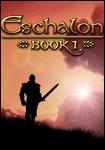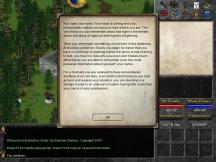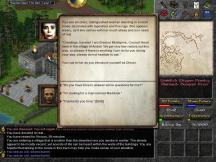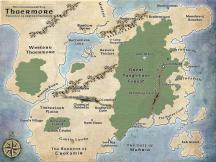Eschalon: Book 1 - First Impressions
Nostalgia is a funny thing. That sentimental yearning for a return to the classic gameplay of the past underscores the wishes of many roleplaying fans but it can be hard to separate the veracity of those wistful memories from simple rose-coloured self-deception. Reality is undoubtedly more complex but for all the advances in technology, there’s a level of depth, challenge and charm missing in many modern games. Enter Basilisk Games with Eschalon: Book 1, which unashamedly looks to embrace the past and recreate the joy of playing an Ultima, Might & Magic or Wizardry.
Eschalon is a traditional 2D, tile-based, turn-based CRPG with stat-driven gameplay. Set in the fantasy world of Eschalon, the player awakes in mysterious circumstances in a corner of the Commonwealth of Thaermore, with no equipment and unaware of their identity or what happened. A strange note is the only clue as the player sets out to discover their true identity.
It sounds like a story line we’ve all played before but with the dozen hours I’ve spent with Eschalon so far, it plays much better than that summary reads. I haven’t progressed very far with the main quest but I’ve played around with several different character types, pursued a number of side-quests and experimented with the game’s mechanics. So, on with some early impressions.
The first thing that strikes you is the production values – this is a beautifully crafted game that doesn’t just set a new benchmark for indie CRPGs, it would be perfectly at home on retail shelves if it wasn’t for the fact that 2D games have been long abandoned. From the main menu on, the presentation is stellar, with a crisp and elegant interface that’s both easy to use and attractive, clean graphics and solid sound. It’s clear considerable thought has been put into the interface and controlling the game and there are many AAA projects that don’t do anywhere near as well. The only downside is the disappointing resolution, which is fixed at 800x600 – although you can play in a window.
Character creation is a key part of the game, despite only being able to play a human male. There are eight primary attributes, divided into physical (strength, dexterity, endurance, speed) and mental (intelligence, wisdom, perception, concentration). A starting set of stats is rolled and a further 15 points can be distributed. There are also five origins, as well as five axioms and five classes to choose from.
The origins confer different attribute bonuses (Nor’landers, for example, are hardy folk and gain +2 Endurance and +1 Concentration), while axioms are essentially belief systems, such as “Atheistic” or “Virtuous”. Eschalon has an interesting approach with axioms – virtuous characters automatically receive the bless spell without requiring the normal divination skill but they are more susceptible to evil curses. Atheists, on the other hand, don’t believe in supernatural bunk so they are immune to curses but also miss out on bless and healing from a friendly priest.
The five classes are Fighter, Rogue, Ranger, Magick User and Healer. Each class automatically confers a preset skill (swords for fighters and pick locks for rogues, for example) but Eschalon uses a skill-based system so from here on, players can create any type of character they like with any mix of skills.
Finally, there are 20 skill points that can be used to buy and improve skills from the range of 25 available. Some of the more interesting skills include alchemy and cartography (the automap requires the cartography skill to function), as well as the expected collection of weapon, armour and magic options. Mercantile is the only speech skill.
In the game proper, players will discover a fantasy world at war, with destroyed villages, abandoned homes and invading monsters. The control isn’t quite the typical point-and-click you’d expect - instead, the arrow cursor indicates the direction of movement and you click to move in that direction; there’s no automatic pathfinding. The advantage of this scheme becomes immediately obvious when you “lock” the walk movement on with a middle-click, so you can steer the avatar around without the usual repetitive clicking.
As mentioned, I haven’t progressed very far with the main quest but the quests I have done have been interesting with solid dialogue and lots of nice text exposition to set the scene. In most cases, there are a few responses to choose from to allow the player some expression of their character, and although there are no speech skills, some lines occasionally have tags such as [threaten], although I’m unsure if this involves any skills checks.
It doesn’t take long for little, relatively insignificant things to bring a smile as they evoke a sense of old classics like the Ultima series. Drink a potion and the flask remains – perfect for your own alchemy. Chests and doors can be bashed if you don’t have the lock-pick skill but it’s hard on weapons and they’re likely to break. Take on a lock that’s well above your skill and although you can try over and over, you’re likely to break your lockpicks rather quickly. You can take torches from the walls of dungeons – or alternatively, put torches into wall sconces to light an area. It’s not quite as interactive as the best of the genre but the world feels satisfyingly real, responsive and interesting to explore.
Exploration is probably the heart of Eschalon, based on our time so far. Chests, hidden stashes and encounters abound and often in hidden corners off the main path, so explorers will be rewarded with both quests and additional treasure (or trouble). The actual world is large, open and broken into big maps – walking off the edge loads the next map within a couple of seconds, so the gameworld is almost continuous save some short load screens. Dungeons so far have been reasonably complex affairs with lots of switches, traps and locked doors. A particular feature of Eschalon dungeoneering is dealing with the dark – without a torch or other light source it’s literally pitch black. There’s a real sense of adventure as you stock up on equipment and head into the dark, with your torch casting a pitiful illumination…or when deep into the labyrinth the torch burns out and you realise you’ve only got a couple left.
Speaking of the dark, rogues and similar characters get a lot of love with skills such as pick locks, skulduggery (traps), find hidden, move silently, hide in shadows and dodge. Quests yield far more experience than combat, so using the shadows to slip past monsters is a valid approach or together with a Cat’s Eyes potion, the darkness can be used to great effect to attack enemies who suffer a big penalty with no light.
Sooner or later, you’ll need to engage in some combat. Eschalon uses an unusual turn-based system but we need to see a lot more to understand how it develops throughout the game. So far, rather than a traditional action-point system, each combatant gets a single movement or attack and then the turn automatically ends and switches to the other side. This leads to a fast-moving system than can almost appear real-time if the player clicks fast enough. For example, going head-to-head with a monster in melee, a single click performs a standard attack. The turn ends instantly, the monster attacks and it’s back to the player – and so on. It’s simple and fast but lacks the tactical depth of action-points – although this may change with higher skill levels. Magic, potions and equipment can all add extra depth for the right characters.
Like most “old-school” CRPGs, combat is an important part of the gameplay but the mix of combat versus exploring and questing is probably in line with titles such as Baldur’s Gate, although the difficulty is perhaps a notch or two higher. So far, the game has been rock-solid and bug-free, apart from a couple of rare typos.
Eschalon is a welcome return to classic stat-based CRPG gameplay, with crisp graphics reminiscent of Arcanum and a presentation quality that sets a new standard for indie roleplaying games. Despite some question marks over the combat, we can’t wait to delve further into the game for a full review but in the meantime, grab the demo when it is released on the 19th and prepare to be hooked.
Watch for our full review in the coming weeks.

Information about
Eschalon: Book IDeveloper: Basilisk Games
SP/MP: Single-player
Setting: Fantasy
Genre: RPG
Combat: Turn-based
Play-time: 20-40 hours
Voice-acting: None
Regions & platforms
Internet
· Homepage
· Platform: PC
· Released: 2007-11-19
· Publisher: Basilisk Games
More information







